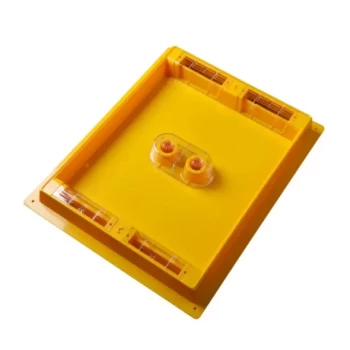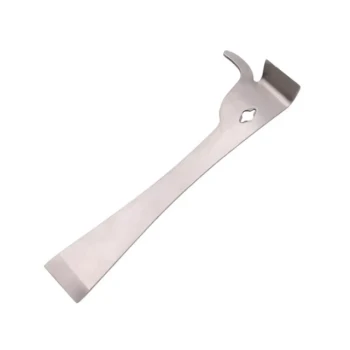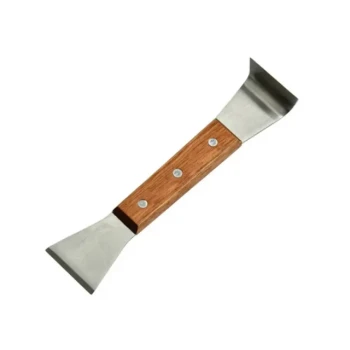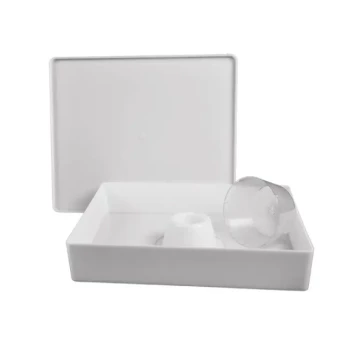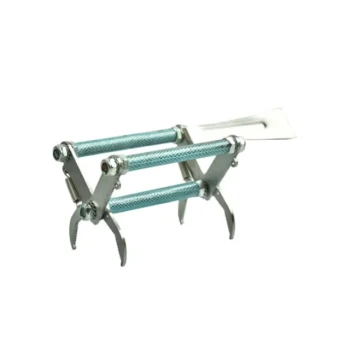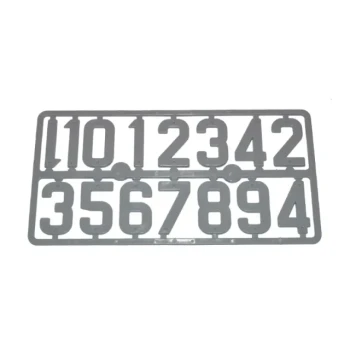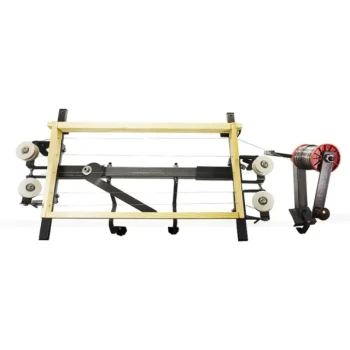At its core, your responsibilities as a Flow Hive owner are identical to those of any other beekeeper. While the device simplifies the single task of honey extraction, it does not change the fundamental duties of hive management, which include conducting regular health inspections, managing pests and diseases, and ensuring your bees have enough food to survive.
The central takeaway is this: The Flow Hive is a tool for harvesting honey, not a substitute for active, responsible beekeeping. The health and survival of your colony depend entirely on your commitment to the same core practices every beekeeper must follow.
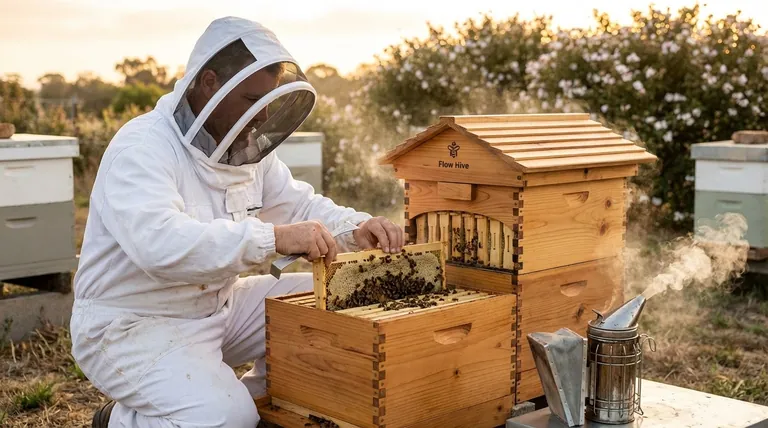
The Myth: Automation vs. Simplification
Many new beekeepers are drawn to the Flow Hive by the promise of "easy" beekeeping. It's crucial to distinguish what the hive simplifies from the work that remains your responsibility.
What the Flow Hive Actually Does
The Flow Hive's key innovation is its unique frame design. This allows you to harvest honey by simply turning a key, which drains the honey directly from the comb into a jar.
This process eliminates the need for traditional, labor-intensive extraction equipment like centrifuges, uncapping knives, and filters.
What It Doesn't Do: The Core Work of Beekeeping
The Flow Hive does not automate bee care. The colony living inside it is subject to the same challenges as any other honey bee colony.
Your core responsibilities for hive stewardship remain unchanged, regardless of the brand or type of hive you use.
Your Core Responsibilities as a Flow Hive Beekeeper
Successful beekeeping hinges on consistent observation and intervention. The Flow Hive does not give you a view into the brood box, where the queen lays eggs and the colony's health is determined.
Regular Hive Inspections
This is your most important duty. You must open the hive to check the brood box (the lower boxes where bees raise their young).
During an inspection, you are looking for a healthy brood pattern, signs of the queen, and adequate food stores (pollen and honey). These checks are essential for catching problems early.
Pest and Disease Management
Your bees are vulnerable to threats, and you are their primary line of defense. The most significant threat for beekeepers worldwide is the Varroa mite.
You must regularly monitor mite levels and be prepared to treat the colony when necessary. Ignoring pests like Varroa is the fastest way to lose a hive.
Ensuring Adequate Nutrition
Bees need honey and pollen to survive. You must ensure your colony has enough food, especially heading into winter or during a "dearth" when few flowers are blooming.
This may require you to provide supplemental feeding, such as sugar water or pollen patties, to prevent starvation.
Space and Swarm Management
A healthy, growing colony will eventually run out of space. When this happens, their natural instinct is to swarm, meaning about half the bees and the queen will leave to find a new home.
Your job is to manage the hive's space by adding more boxes (supers) as needed to prevent swarming and keep your colony strong.
Understanding the Trade-offs
The convenience of the Flow Hive can inadvertently create new challenges for the undisciplined beekeeper.
The Risk of "Out of Sight, Out of Mind"
The greatest risk of the Flow Hive is that its ease of use can lead to neglect. Because you don't have to open the hive to harvest honey, it can be tempting to skip essential health inspections.
This hands-off temptation can allow disease, pests, or a failing queen to go unnoticed until it is too late.
The Danger of Over-Harvesting
Turning a tap is so easy that new beekeepers can be tempted to take too much honey. Honey is the bees' food source for the winter.
Harvesting too much, especially late in the season, can leave the colony without enough resources to survive the cold months, leading to starvation. A responsible beekeeper always ensures the bees have more than enough honey for themselves before taking any.
Applying This to Your Practice
Your success will be defined by your approach to bee stewardship, not the equipment you purchase.
- If your primary focus is responsible beekeeping: Treat the Flow Hive as just one tool in your toolbox and prioritize your education on bee biology, health, and seasonal management.
- If your primary focus is simplified honey harvesting: The Flow Hive excels at this, but you must commit to a strict schedule of regular, full-hive inspections to ensure the colony that produces the honey remains healthy.
Ultimately, a successful beekeeper is a steward of the colony, and that responsibility remains the same no matter how you choose to collect the honey.
Summary Table:
| Core Responsibility | Why It's Essential for Flow Hive Owners |
|---|---|
| Regular Hive Inspections | To check the brood box for queen health, disease, and food stores. The Flow Hive doesn't show this area. |
| Pest & Disease Management | To monitor and treat for threats like Varroa mites, the leading cause of hive loss. |
| Ensuring Adequate Nutrition | To prevent starvation by ensuring bees have enough honey, especially before winter. |
| Swarm Management | To prevent swarming by adding space (supers) as the colony grows. |
Equip yourself for success with HONESTBEE.
As a commercial apiary or beekeeping equipment distributor, your success depends on reliable, high-quality supplies. The Flow Hive is just one tool; the health of your colonies depends on your entire operation.
HONESTBEE supplies the essential beekeeping supplies and equipment you need—from mite treatments and feeders to full hive components—through our wholesale-focused operations. Let us be your trusted partner in maintaining strong, productive colonies.
Contact HONESTBEE today to discuss your wholesale supply needs.
Visual Guide
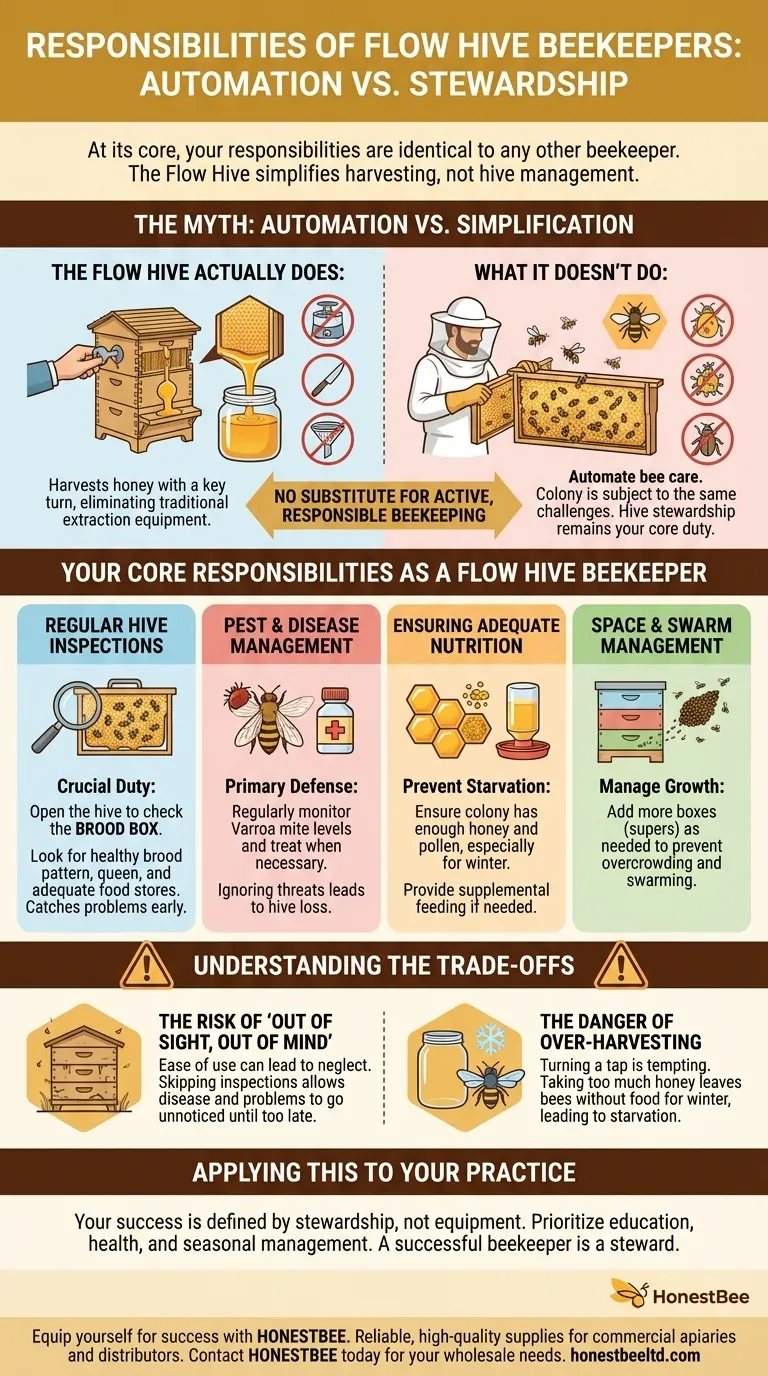
Related Products
- HONESTBEE Professional Long Handled Hive Tool with Precision Cutting Blade
- HONESTBEE Advanced Ergonomic Stainless Steel Hive Tool for Beekeeping
- HONESTBEE Professional Multi-Functional Hive Tool with Ergonomic Wood Handle
- Professional Hive Top Bee Feeder for Beekeeping
- Professional Multi-Function Stainless Steel Hive Tool
People Also Ask
- What are the difficulties of conducting a beehive inspection without a hive tool? Avoid Propolis and Colony Stress
- How does standardized beehive manufacturing equipment improve the productivity of commercial apiaries?
- What are the core process advantages of professional hive-making machinery? Scaling Commercial Apiaries with Precision
- How can a hive tool be used to remove propolis and burr comb? Master Hive Maintenance for a Healthy Colony
- Why use professional beekeeping tools for beehive inspections? Crucial Support for Pollinator Protection Policies



